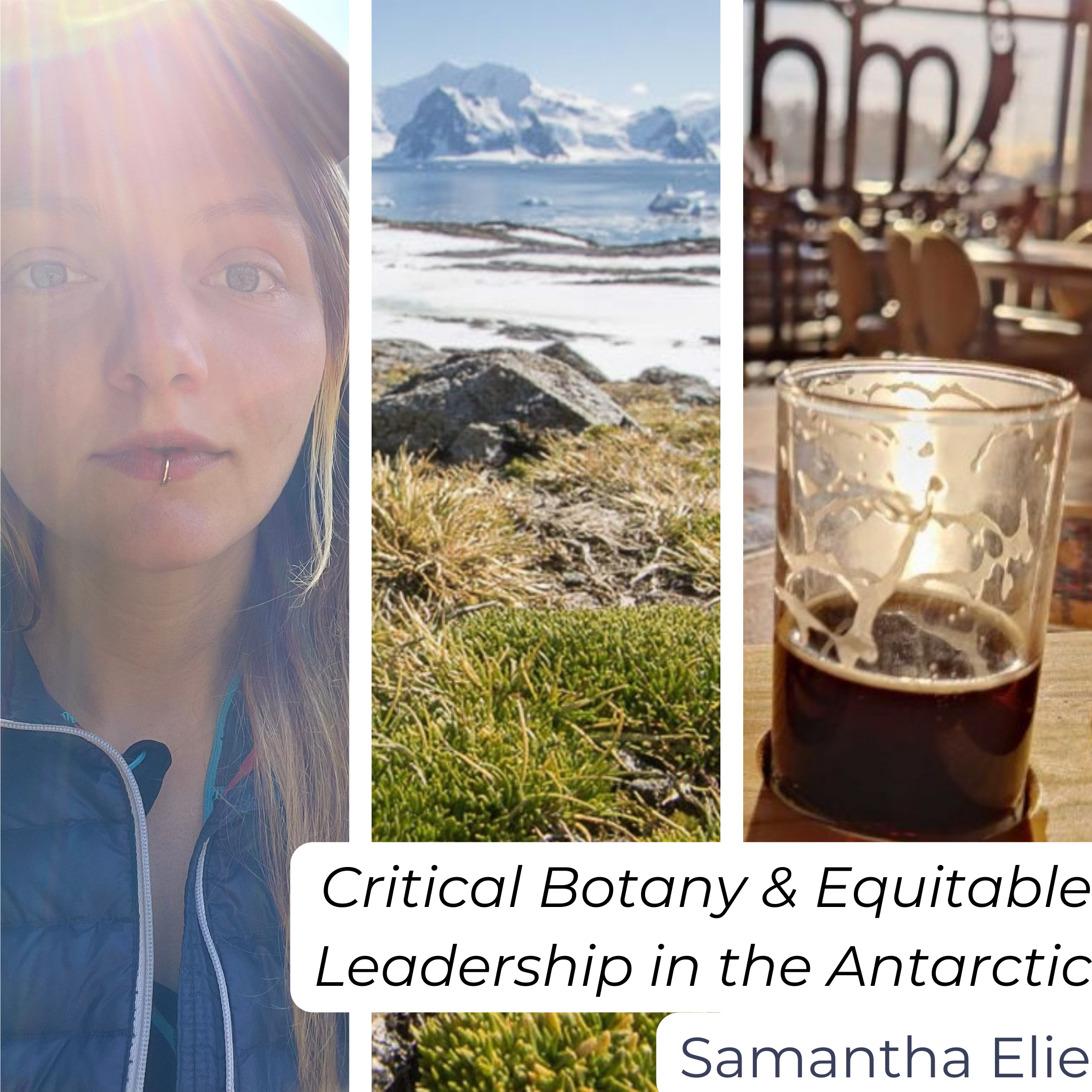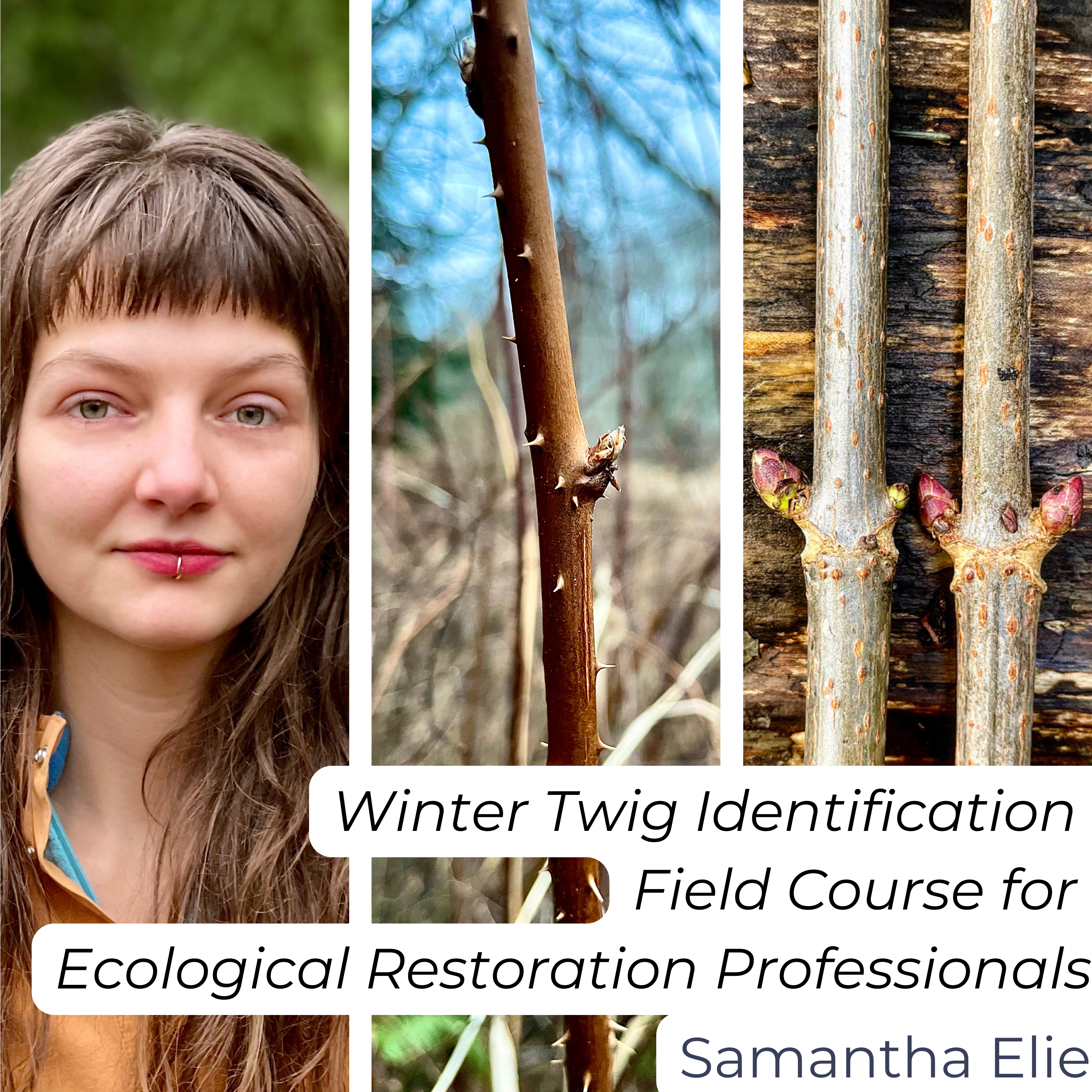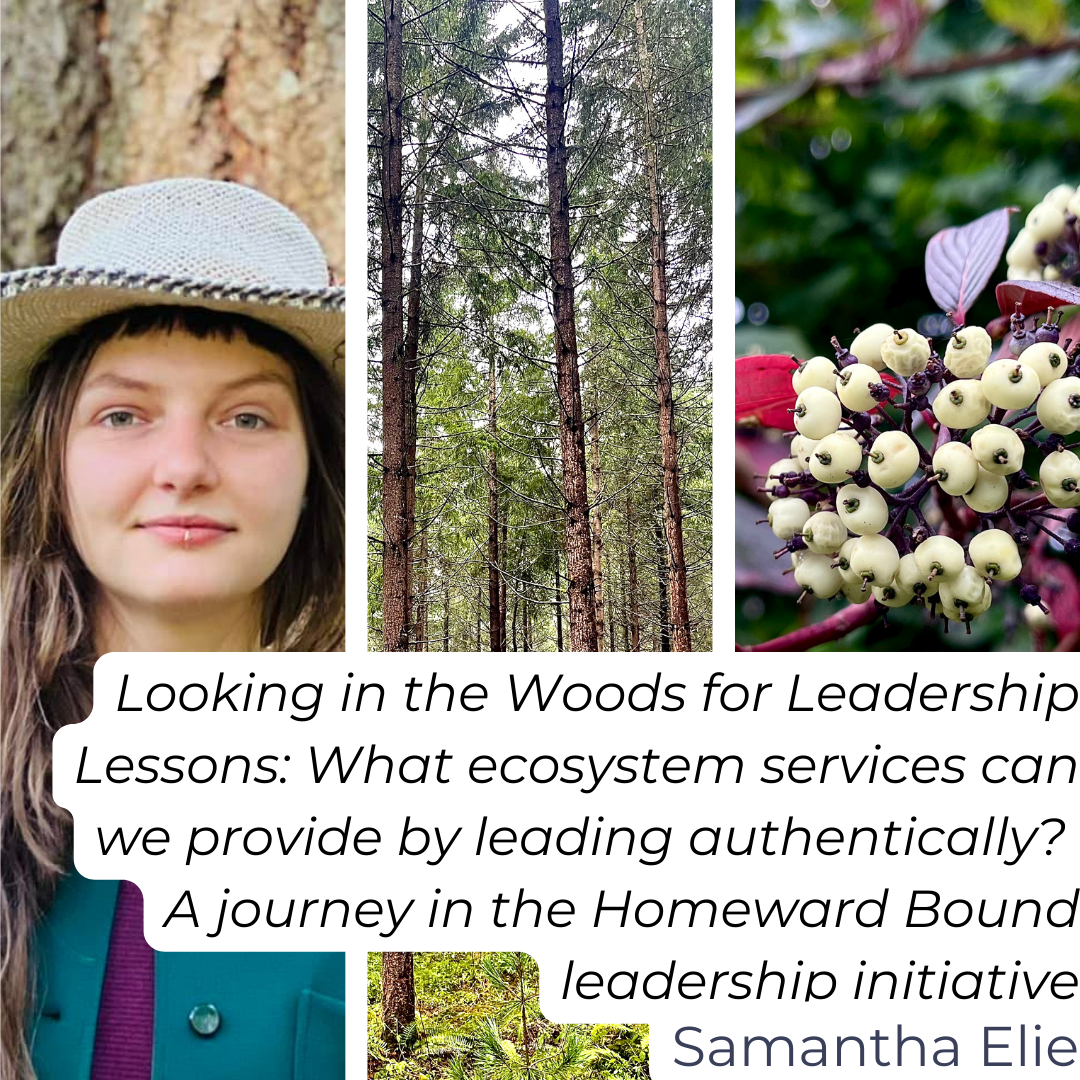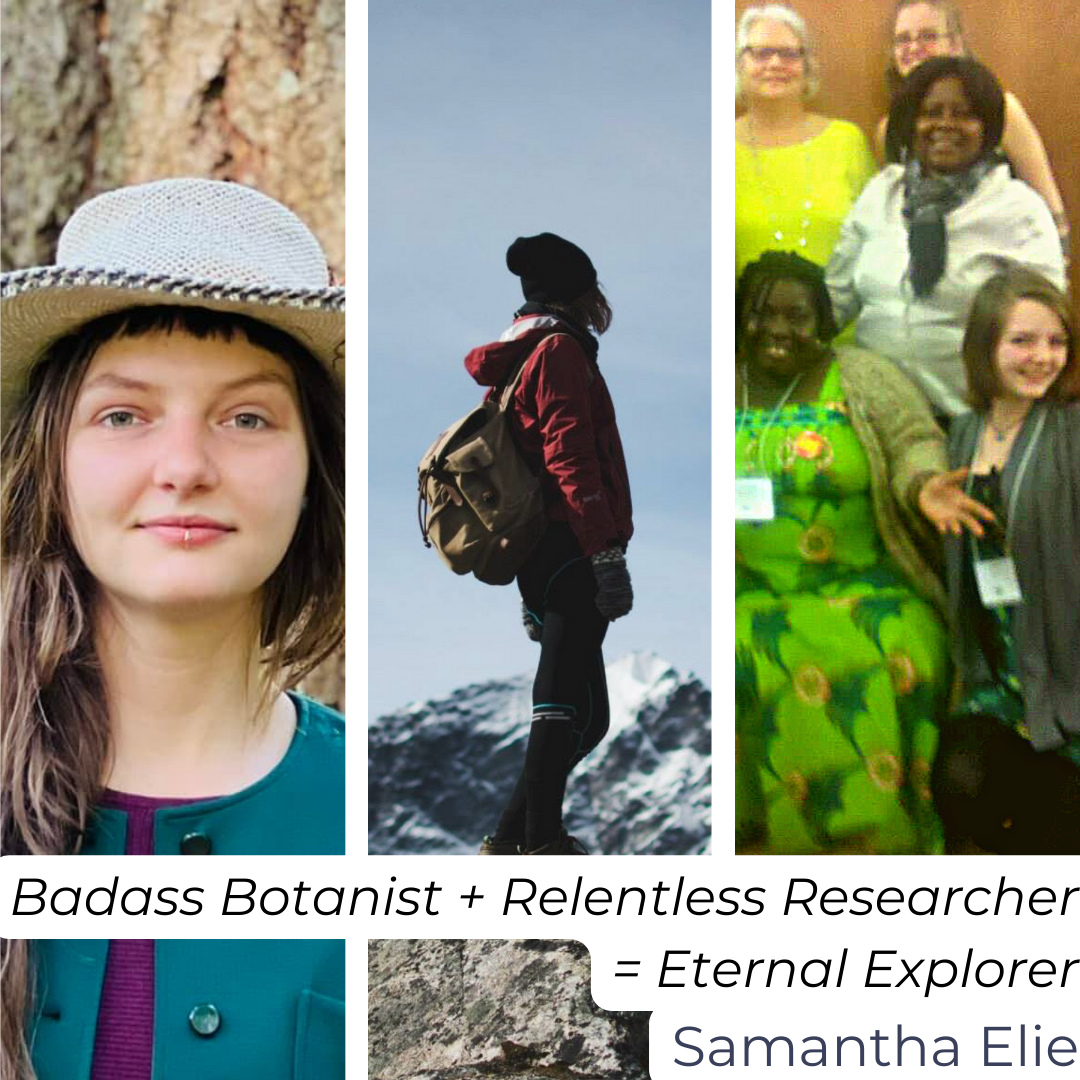Presentations, Teaching & Trainings
Presentations, Teaching, and Trainings
Follow the links below to jump to sections.
Critical Botany & Equitable Leadership in the Antarctic
Winter Twig Identification Field Course for Ecological Restoration Professionals
Ecosystem Services and Field Identification of Select Southern Salish Lowland Native Plant Cuttings
Looking in the Woods for Leadership Lessons: What Ecosystem Services can we Provide by Leading Authentically?
Badass Botanist + Relentless Researcher = Eternal Explorer
Teachings and Trainings Facilitated with the Native Plant Salvage Foundation
Support independent botany research and plant-based community education on Patreon today.
Plant-based community education is made possible by my Patreon supporters. Thank you for underpinning my independent research and believing that plants can change the world.
Email Samantha to discuss plant-based community education for your group!
Are you interested in having Samantha run a workshop, field course, or presentation for your team on native plants and their ecosystem services? Inquire via email!
Critical Botany & Equitable Leadership in the Antarctic
2023 · Headless Mumby Brewing Co.
This interactive science pub talk event was split into two parts: my presentation, then a structured and audience Q&A session. My presentation was also split in two parts, Equitable Leadership and Critical Botany. I began by introducing the Homeward Bound project, for which I was selected to participate and expedition to Antarctica. Homeward Bound is a groundbreaking leadership initiative for women and non-binary people with a STEMM background. It aims to increase their leadership capability by enhancing their influence and impact on the decisions that shapes our planet. I discussed how the need for equity in leadership extends beyond gender but also includes things such as race, economic background, language, lifestyle, etc.. Just as biodiversity strengthens ecosystems, human diversity in both science and leadership ensures resilience in our shared future. In the critical botany section I highlighted Colobanthus quitensis, Deschampsia antarctica, Antarctic mosses, lichen, and as it was a science pub talk, beer. I summarized how each is being affected by the rapid climate change that is radically altering the Antarctic landscape.

Winter Twig Identification Field Course for Ecological Restoration Professionals

2023 · Sound Native Plants
Much of Pacific Northwest ecological restoration planting happens when plants are dormant and without telling foliage, but twigs are a niche study and many people working in restoration are not trained on how to identify commonly used plants without their leaves. Therefore this 3.5 hour workshop covers key winter identification characteristics of thirty prominent “restoration-superstars” of the southern Salish Lowland and northern Willamette Valley ecoregions. Ecological associations and silhouette identification techniques are emphasized in addition to fine twig details in order to broaden professional applications.
Ecosystem Services and Field Identification of Select Southern Salish Lowland Native Plant Cuttings
2023 · Harstine Island Garden Club
The native plants that can be grown from cuttings are dynamic tools that restore communities by putting plant-power in the hands of the public. Cuttings are sections of plant stem strategically harvested and installed to grow entire new plants. The native plants that can be grown from cuttings provide bountiful ecosystem services, namely erosion management, weed control, and habitat creation. Populus trichocarpa, Salix spp., Cornus sericea, Symphoricarpos albus, and Physocarpus capitatus have all shown great success when cuttings are propagated in the nursery setting and installed in the field as bioengineering materials for ecological restoration. Cuttings are an easy and inexpensive way to grow plants native to the southern Salish Lowland ecoregion. Winter field identification skills are needed to harvest cuttings. This two-part workshop opened with a hands-on field identification activity with cuttings of the five focus species, offering tangible pretext for the presentation.

Looking in the Woods for Leadership Lessons: What ecosystem services can we provide by leading authentically? A journey in the Homeward Bound leadership initiative

2022 · The WALT Institute
Basic principles of ecology are reflected in human societies. We are part of the same systems, not separate from them. Diversity enhances ecosystem resilience: the group is strengthened when we connect a diversity of people and collaborate. The Homeward Bound leadership initiative aims to increase global leadership diversity by growing the number and capabilities of femme leaders in STEMM. This is one journey of grounding in authentic leadership through a walk in the woods. We will connect Pacific Northwest native plants and the services and lessons they give, with the work of Homeward Bound and authentic leadership.
Badass Botanist + Relentless Researcher = Eternal Explorer
2021 · The Leading Ladies Club
When we empower young people, we empower the future.
Young femmes around the world have vital offerings to share, but are often discouraged from the exploration, travel, and research needed to develop and disperse ideas. Samantha shares stories of international studies and fundraising taken-on as a young person to inspire the next generation to break gender norms and be international movers-and-shakers.
Samantha has contributed to the United Nations Commission on the Status of Women with The Working Group on Girls, led for climate action internationally and in the Pacific Northwest, studied on five continents, and is headed to Antarctica in 2023 with an international team of femme-in-STEMM to hit number six before reaching 30 years old.

Biology & Ecological Concepts Teacher
2015/16 Academic Year · Heartlife Imagineering Homeschool Co-op
Developed academic curriculum and budget for a mixed-grade classroom of students ages 11-15. Lessons covered introductory biology with themes of urban ecology. Taught in-person for two and a half hours a week and provided independent coursework to supplement an additional three hours of learning within the homeschool co-op model. Curriculum was place-based and art-centric in order to encourage student maturation in creativity and leadership.
Teachings & Trainings Facilitated with the Native Plant Salvage Foundation
Native Plant Excursions
2020
Samantha and a past board member developed the Native Plant Excursions program with enthusiasm for duly expanding the non-profit’s education audience and ecosystems of study. These events are packed with adventure and delight. Because of our stellar partners, often NPSF is allowed to access otherwise restricted ecosystems for careful botany crawling. Highly recommend checking them out if you are near Olympia, WA www.nativeplantsalvage.org/excursions
In-person all day naturalist field trainings for the public identifying the variety of life in a range of Pacific Northwest ecosystems:
- Sub-alpine winter twigs, trees, mosses, lichen, and animal track/scat identification. Mt. Tahoma Trails Association, Mt. Rainier, WA.
- Coastal freshwater and sphagnum bog trees, shrubs, mosses, grass/sedge/rush, and perennial identification. North Bay Natural Area Preserve, Grays Harbor County, WA.
- Lowland coastal forest and shoreline trees, shrubs grass/sedge/rush, and perennial identification. Griffiths-Priday State Park, Copalis Beach, WA.
- Alpine and sub-alpine trees, shrubs, mosses, lichens, grass/sedge/rush, and perennial identification. Noble Knob, Mt. Rainier, WA.
Riparian & Lowland Forest Stewardship & Restoration
2018 - 2023
In-person field trainings for the public and professionals on riparian, estuary, and lowland ecosystem restoration and maintenance, native plants, and habitat conservation. Taught a variety of strategies for installation and plant selection. See Past Projects section for some specific restoration sites and partners.
Rain Garden Building
2018 - 2020
in partnership with Jefferson County Marine Resource Center, Northwest Straits Foundation & Washington State Uni., Jefferson Co. Extension
In-person field trainings on Rain Garden construction and proper planting technique in addition to “in-class” sessions on preplanning strategy, funding availability, and plant selection.
Winter Twig Identification Field Course
2019, 2020 & 2023
in partnership with Thurston County Stream Team & Washington State Uni., Thurston Co. Extension
In-person field trainings for the public to identify 25 trees and shrubs native to the southern Salish Lowlands in their leafless-states.
Native Plant Propagation
2018 - 2023
in partnership with Thurston County Stream Team & Washington State Uni., Thurston Co. Extension
In-person trainings for the public on native plant propagation from seeds, starts, cuttings, and salvaging at the Foundation’s nursery and holding beds.
Native Plant Salvaging
2018 - 2023
in partnership with Thurston County Stream Team & Washington State Uni., Thurston Co. Extension
In-person field trainings for the public and professionals on native plant identification, salvaging, and propagation strategies.
Native Plant Outings
2018 - 2020
in partnership with Thurston County Stream Team & Washington State Uni., Thurston Co. Extension
In-person field trainings for the public and professionals to identify lowland riparian South Salish native plants in their blooming and fruiting states.